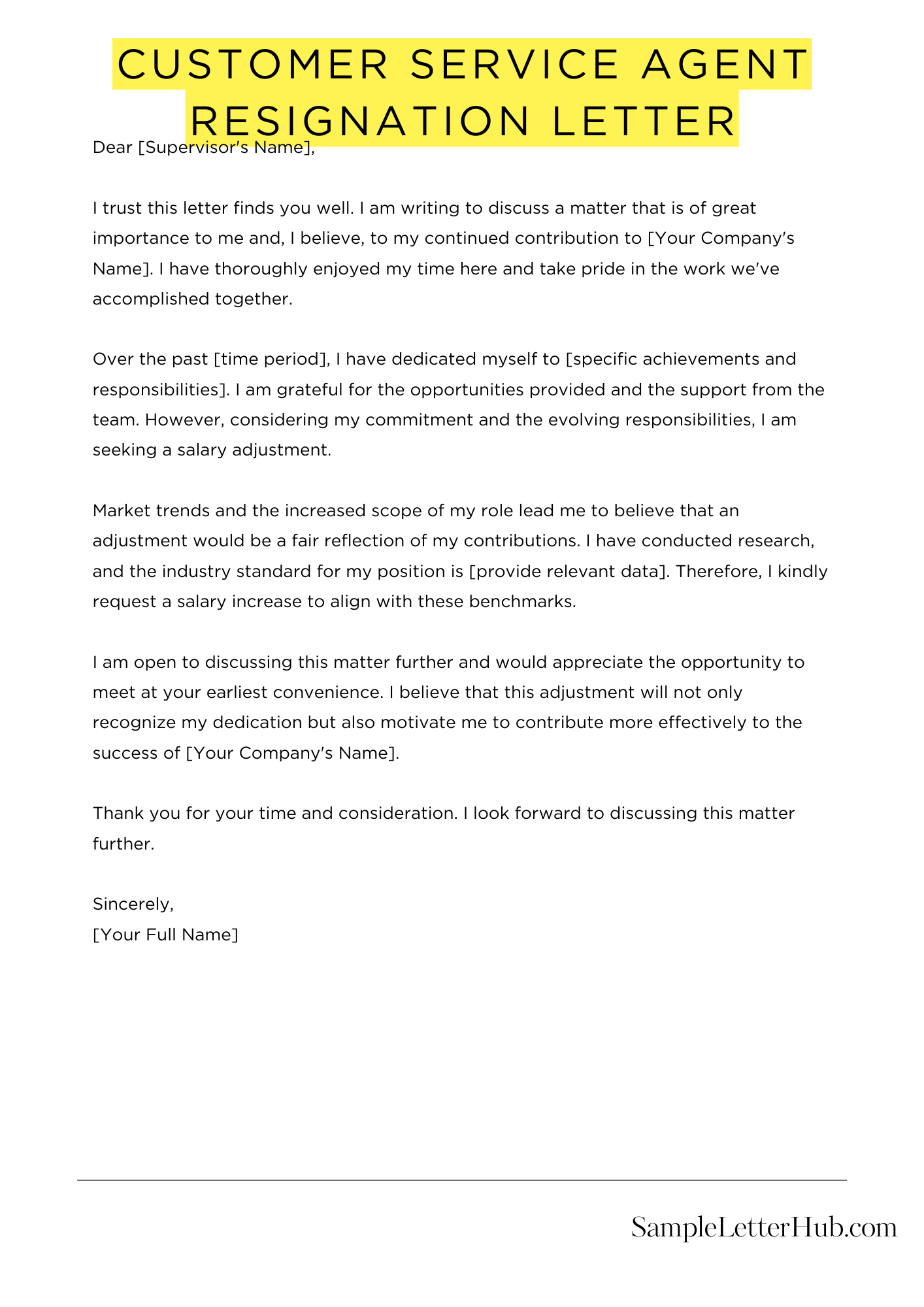Are you a customer service agent looking to move on to new professional pastures? Writing a clear and professional resignation letter is a crucial step in leaving your job on good terms. In this article, we’ll share an example of a customer service agent resignation letter to help you craft your own.
When writing your resignation letter, politeness and humility are key. Express your gratitude for the opportunity to work at the company and highlight the valuable experiences you’ve gained. Keep your tone professional and avoid any negativity or complaints.
Below, we’ve provided a template for a customer service agent resignation letter that you can adapt to your specific situation. Remember to tailor the letter to your own circumstances and experiences, making it a unique reflection of your time with the company.
Customer Service Agent Resignation Letter
Dear [Manager’s Name],
Please accept this letter as formal notification that I will be resigning from my position as Customer Service Agent at [Company Name], effective [last date of employment].
I have enjoyed my time at [Company Name] and am grateful for the opportunities I have been given. I have learned a great deal and have developed valuable skills that will serve me well in my future endeavors.
I wish you and [Company Name] all the best in the future.
Sincerely,
[Your Signature]
Short Customer Service Agent Resignation Letter Sample
Please accept this letter as formal notification that I am resigning from my position as Customer Service Agent at [Company Name]. My last day of employment will be [Your Last Day]. Thank you for the opportunity to grow and learn during my time here. I wish you and the company continued success. I am happy to assist in the transition process to ensure a smooth handover of my responsibilities.
I wish you all the best with your customer service agent resignation letter.
When it’s time to say farewell, expressing your gratitude and best wishes can make the transition smoother:

How to Write a Customer Service Agent Resignation Letter
Writing a customer service agent resignation letter can be a daunting task, but it doesn’t have to be. With a little planning and preparation, you can craft a letter that is both professional and respectful.
1. Start with a Formal Salutation
Begin your letter with a formal salutation, such as “Dear [Manager’s Name].” If you don’t know your manager’s name, you can use “To Whom It May Concern.”
2. State Your Intention to Resign
In the first paragraph, clearly state your intention to resign from your position as a customer service agent. Be sure to include your last date of employment.
3. Express Your Gratitude
Take a moment to express your gratitude for the opportunity to work as a customer service agent. Mention any specific experiences or people that have made your time at the company meaningful.
4. Offer to Help with the Transition
Let your manager know that you are willing to help with the transition during your notice period. This could include training your replacement or helping to document your processes.
5. Close with a Professional Tone
End your letter with a professional tone. Thank your manager again for the opportunity to work at the company and wish them all the best in the future.
6 Most Frequently Asked Questions About Customer Service Agent Resignation Letters
When it comes to leaving a customer service agent position, it’s important to do so professionally and respectfully. A well-written resignation letter can help you maintain a positive relationship with your former employer and leave a lasting impression. Here are six frequently asked questions about customer service agent resignation letters, along with answers to help you craft a strong letter:
1. What should I include in my resignation letter?
Your resignation letter should include the following information:
* Your name and contact information
* The date
* The name of the company you’re resigning from
* The name of the person you’re submitting the letter to (usually your manager)
* A statement of your resignation
* Your last date of employment
* A brief expression of gratitude for the opportunity to work at the company
2. How should I format my resignation letter?
Your resignation letter should be formatted in a professional manner. Use a standard font, such as Times New Roman or Arial, and keep the letter concise and to the point. You can use the following format:
* **First paragraph:** State your resignation and your last date of employment.
* **Second paragraph:** Express your gratitude for the opportunity to work at the company.
* **Third paragraph:** (Optional) Offer to help with the transition during your notice period.
* **Closing:** Thank the person you’re submitting the letter to for their understanding and wish them well.
3. What should I say in my resignation letter?
Your resignation letter should be clear and concise. Avoid using vague language or overly emotional language. Instead, focus on the facts and express your gratitude for the opportunity to work at the company. Here are some examples of what you can say:
* “I am writing to inform you of my decision to resign from my position as a customer service agent at [company name], effective [last date of employment].”
* “I want to thank you for the opportunity to work at [company name]. I have enjoyed my time here and I am grateful for the experience I have gained.”
* “I am happy to help with the transition during my notice period in any way that I can.”
4. What should I do if I’m not sure what to say in my resignation letter?
If you’re not sure what to say in your resignation letter, you can use a template or consult with a career counselor. There are also many online resources that can help you write a strong resignation letter.
5. What should I do after I submit my resignation letter?
After you submit your resignation letter, you should meet with your manager to discuss your departure. Be prepared to answer any questions they may have and offer to help with the transition during your notice period.
6. What if I want to leave on good terms?
If you want to leave on good terms, it’s important to be professional and respectful throughout the resignation process. Give your employer ample notice, offer to help with the transition, and express your gratitude for the opportunity to work at the company.
Before making the decision to resign from your job, it’s essential to consider the legal aspects:
Understanding your emotions after quitting your job is important. Explore why you might be feeling sad:
Related
- Resignation letter sample
- Forced resignation letter
- Resignation letter due to going abroad
- Resignation letter due to marriage
- Resignation letter due to other opportunity
- Resignation letter due to mistake

